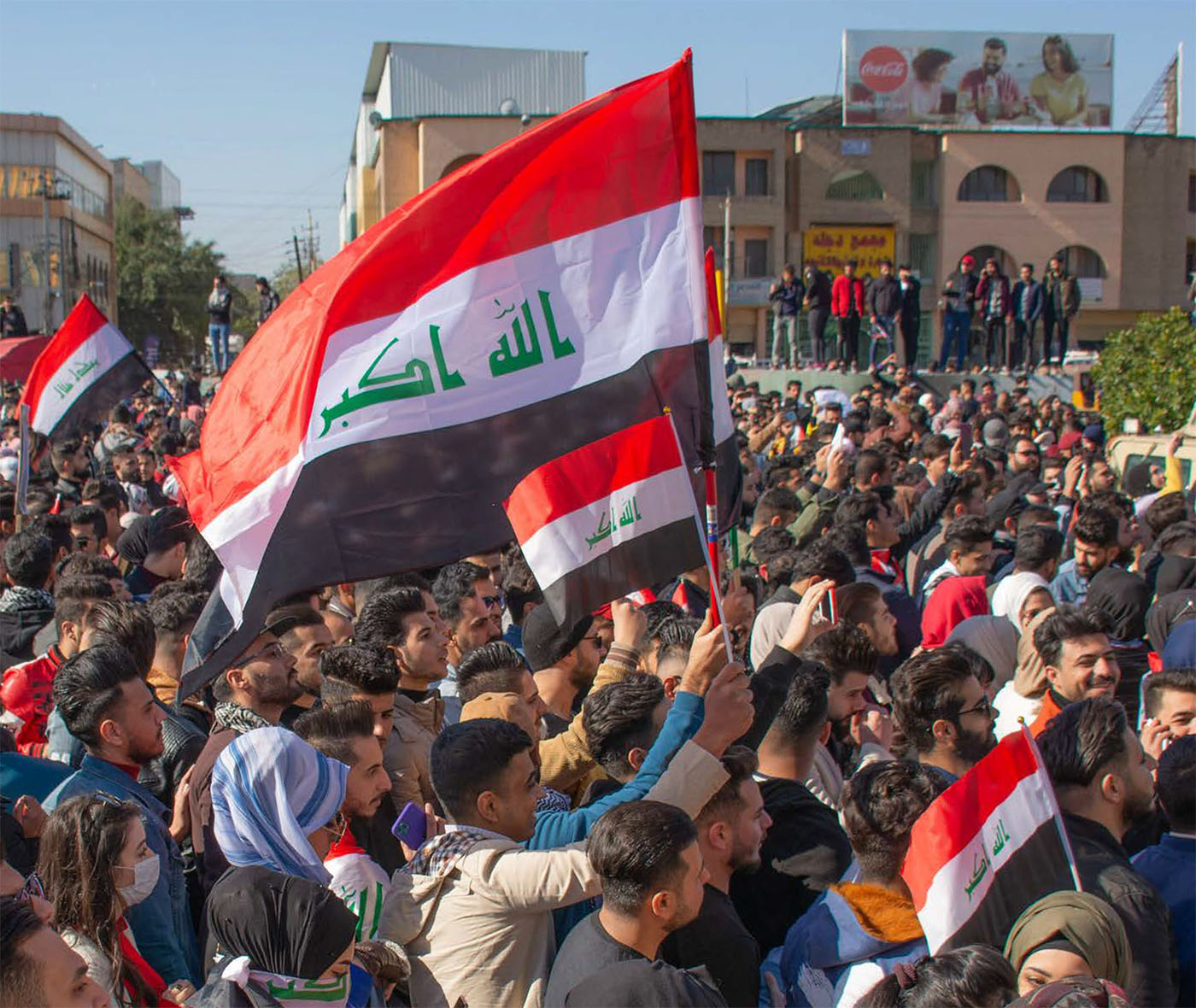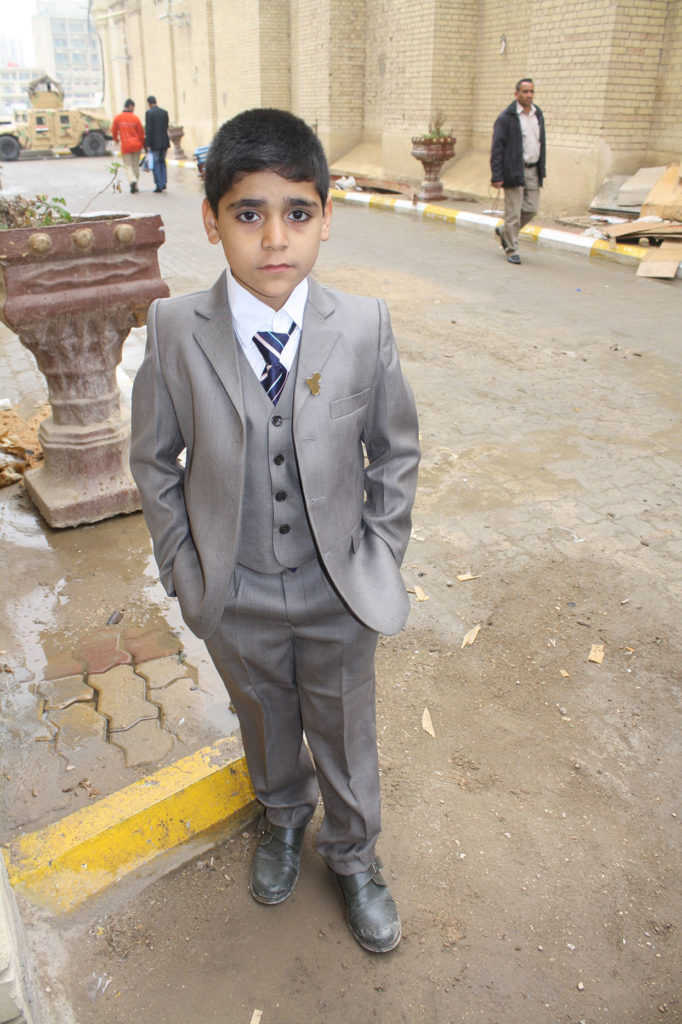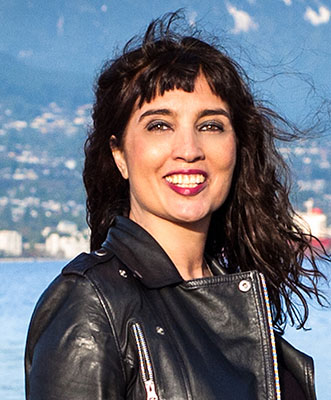
October marks the second anniversary of Iraq’s thawra. The non-violent Tishreen movement continues to demand all the things many of us take for granted. Tens of thousands of Iraqis have marched in cities across the country. Notes Beau Beausoleil, editor of the Al-Mutanabbi Street Starts Here anthology, “Those marching are workers, students, professionals, writers and artists, women and men…The Iraqi government brought down an iron fist on these activists and using its security services and government sponsored militias, killed more than 700 men and women and wounded more than 10,000…A revolution that begins in the hearts of ordinary citizens cannot be erased by thugs and killers. The Iraqi people will rise again and again until true change comes to every Iraqi.” [Ed.]
Hadani Ditmars
A week after a thousand protestors marched in Tahrir Square to mark the two year anniversary of fierce protests in the Iraqi capital, and on the eve of elections, I remember watching them from my hotel room in Erbil, and wonder what has changed, and what will.
From the cavernous confines of room 510 at the Classy Hotel, run by displaced Christians from the Niniveh Plain who had fled the advance of ISIS, and bordered by a statue of the Virgin Mary on one side and the American consulate on the other, I watched it all unfold on Kurdish television in the fall of 2019. During daily excursions to ruined Mosul, where not much has changed in two years thanks to rampant corruption, I learned that people were too afraid to protest. I recall footage of a young man in Baghdad with beautiful eyes, singing a song. Behind him was rubble and smoke. His mask lowered as he sang a poignant protest maqam:Iraq, Iraq, my love, my country. I will fight for you. I will never give up. He was singing for legions of followers on Facebook, the new forum for young freedom seekers, and mainly for people outside of Iraq, where the internet had not been cut off by desperate, corrupt politicians; but he was singing from the heart.

The image recalled one I had taken in 2010, on my last trip to the troubled land, of a boy as old then as the invasion. He stood on Baghdad’s Mutannabi Street during the national election campaign, in front of an old Ottoman villa, once the home of a Jewish judge at a time when Baghdad was 40 percent Jewish, a time before concrete barriers separated neighborhoods across sectarian lines, and before a national protest movement united Iraqis across those same lines. His parents were Communists out campaigning for their candidate, the daughter of the poet Al Jawahari who once wrote:
“Shout at the poor and the hungry, but only if you first insult their tormentors whose bellies are full.”
The boy wore a tiny golden pin in the shape of his country, close to his heart. His adult eyes stared into my camera with a sad defiance. On the edge of the frame, next to a Seljuk buttress, a soldier manned a tank. What had become of that boy now? I sometimes search for a decade-older version of the 7-year-old in the crowds of CNN; but in vain. Everyone has that same look of lonely defiance, the outrage of a lost generation raised only on war and televisual lies; protesting for jobs, for electricity and water, for a life.
There’s no shortage of names and faces to mourn – hundreds of protestors and 35 activists killed since the latest round of protests began in October of 2019, by “unknown entities,” who most believe were powerful Iranian backed militias linked to the Iraqi government that will never be held to account.
But this has been going on for some time. Who remembers activist Khaled al Kahlidi assassinated near his home in Kut, south of Baghdad, in 2015. Or another fresh-faced martyr of the anti-corruption protest movement — his likeness still being tweeted as he stands cautious but proud in a Tahrir Square selfie, in front of Jawad Salim’s famous Monument to Freedom. His eyes bear a premonitory sadness that seems to speak of all the martyrs to the Iraqi cause that have come before him, and those that will follow.
Before the era of sham “democracies” run by corrupt cronyist thugs installed by an illegal and brutal invasion, I remember a time when freedom of speech in Baghdad was limited to staged press conferences by Baathist generals, and we journos had to pay “guides” — essentially spies from the Ministry of Information — for the privilege of their “services.” In this Alice in Wonderland meets Kafka world of the dying days of the Saddam regime, I recall an “election” in 2002.
Despite there being only one candidate who “won” by “100 percent,” as the regime claimed, we were led to a polling station for a “photo-op.” I asked a sympathetic “minder” why, in spite of the total lack of democracy, everyone seemed well-dressed and in good spirits — a kind of a “day-out” for beleaguered sanctions-plagued Iraqis.
“They’re pretending everything is normal,” he explained, “They need to do this to survive.”
Iraqis have been pretending everything is normal for quite some time now. But let’s hope that the current “pretense” that Iraq is a democracy — where citizens have the right to basic services like clean water, electricity, a free press and a government that serves them and not themselves — becomes a reality.
The change must, as always come from within, but more vigorous support for pro-democracy activists from the international community is key to the success of the growing movement that explicitly rejects the post-invasion sectarian cronyism and corruption that feeds the cycle of violence in Iraq.
As I’ve been saying for years, the way to encourage democracy in Iraq is not by supporting brutal dictators — pre- or post-invasion — bombing and starving a captive civilian populace for years, or participating in illegal invasions and occupations. The way forward is through supporting civil society.
The current Iraqi protest movement is living proof of the incredible resilience of a long-suffering people who, while trapped in circumstances beyond their control, persist in fighting for their basic human rights. Let us hope they continue to protest and speak out without fatal consequences, regardless of whichever corrupt crony wins the elections.



